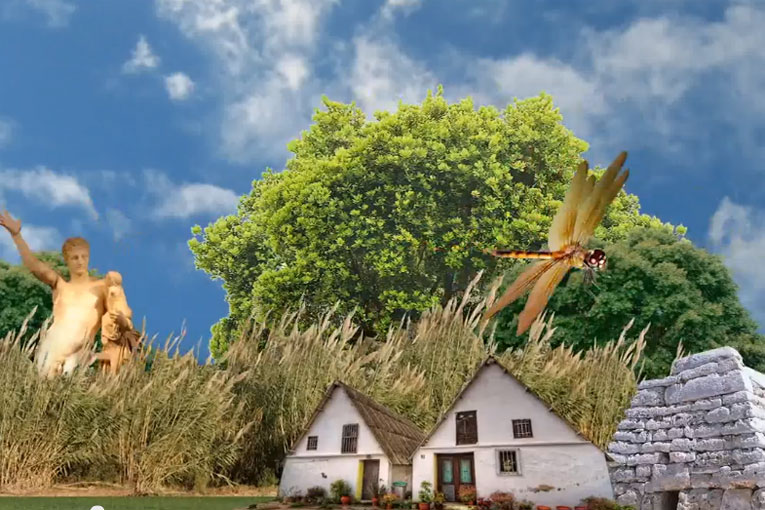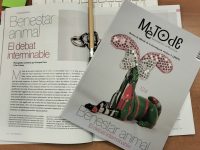
 Ovidi Twins Ovidi TwinsParotet, the rhythmic track chosen for the first video clip, is devoted to insects of the Odonata order, and collects some popular nicknames for them, following the tradition of the old bestiaries. |
||
|
«Poor them, look at them, heading for this world, not knowing why or how». Thus starts Animalets (La Casa Calba, 2013), a unique approach to the animal kingdom by Ovidi Twins, now a trio. They have moved away from the electronic rhythms of their previous works. The album, primarily intended for children, emulates the bestiaries that were popular in the Middle Age: books collecting information about every existing animal – and some inexistent ones – of which they had evidence. This early attempt at zoology is not exempt from the usual funny side of the band, which is even more obvious in the middle of this mix of styles. Among all those beasts there is still room for some poetry by Estellés, a Beatles song and, it could not be otherwise, the Llibre de les bèsties (Book of Beasts) by Ramon Llull, in an album enriched be the support of exceptional contributors. It is difficult to establish a taxonomical categorisation of the creatures chosen by Ovidi Twins, but we can extract some conclusions. Parotet, the frantic track they chose for the first video clip, is devoted to insects of the Odonata order and, just as the old bestiaries, collects some popular nicknames for them such as «cavall de serp» (snake’s horse) or «tallanassos» (nose cutter). We find more insects in Grills, a lovely song in which Gryllidae have the leading role thanks to a fragment of Coral romput by Vicent Andrés Estellés, sung over some music by Greek songwriter Sokratis Malamas and sweetened by the voice of Clara Andrés: «In the verses I write, among all my verses, there are some words with crickety features.» The songwriter from Oliva helped also with Mamífers, an intimate lullaby that reminds us of our place as mammals in the animal kingdom. |
«The album emulates the bestiaries that were popular in the Middle Age: books collecting information about every existing animal of which they had evidence» |
|
 Ovidi Twins Ovidi TwinsFragment of the cover of Animalets (La Casa Calba, 2013), illustrated by Inma Lorente. |
«Turistes abandonats, with a Balcan twist, in which they regret the pigeons and doves lost in the metropolis» |
|
|
The album is actually packed with mammals. El gosset ambelloner is a fandango-bolero that recommends a grandfather buying a Valencian rat-hunting dog for him to walk on the street. L’haqueta de retor tells us, with a funk rumba rhythm, the fable of a working mare who was so used to be hungry that ended up starving to death. Orifany – the name given to elephants by Ramon Llull and his coetaneous – transforms a melody from The Carnival of the Animals by Camille Saint-Saëns in the naïve tale of a pachyderm that walks around the jungle in his pyjamas. And finally a marine mammal: under the title Mmmmeah!!!! there is a nonsensical version of I Am the Walrus by The Beatles. In the album there is a place also for birds. We find Dos pardalets a una aguileta, version of a Valencian folk song, and the funny Turistes abandonats, with a Balcan twist, in which they regret the pigeons and doves lost in the metropolis: «Why don’t you do as the swallows. They know perfectly well where they’re headed.» Conversely, there is only one track devoted to reptiles, but it has an important role: Dinosaures de marjal is the central part of the album and the longest track, features the voice of Vicent Torrent (Al Tall) and the lyre of Spyros Kaniaris (L’ham de foc). Ovidi Twins are actually the most difficult specimens to classify. They do not fit any category and stubbornly follow their own instincts. Following the unorthodox way they started walking ten years ago, with one foot on traditional Valencian music and another one dancing across many different styles, in Animalets they mutate with every song and drink from a thousand different sounds. Two constants can be observed, though. First, their trademark sense of humour. And second, maybe as a consequence of the young target audience of the album, a particularly educational vocation, essential requirement for any worthy bestiary. Felip Pineda. Journalist. Revista Mètode, University of Valencia. Something to listen to: |
«Ovidi Twins are actually the most difficult specimens to classify. They do not fit any category and stubbornly follow their own instincts» |
|





